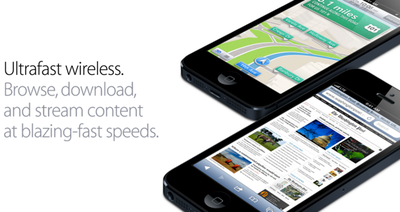Apple Must Approve Carrier LTE Networks Before Allowing iPhone 5 to Connect to Them
Apple does not allow the iPhone 5 to join a carrier's LTE network until it passes the company's own internal tests, according to Swiss cell carrier Swisscom. The report from Telecoms.com (by way of The Next Web), says that Apple enables LTE support on existing iPhone 5 models only after first testing the carrier network itself.

This week, however, a Swisscom spokesperson told Telecoms.com that: "Apple only enables 4G access after testing their device on an operator’s live network."
Swisscom launched its LTE network this week although the iPhone 5 was not available as an LTE device at launch. "Apple will provide a software update in due course," the firm said in a press release.
Apple has been selling the iPhone 5 in countries where it doesn't officially support LTE on any carriers, though most carriers have at least initial plans to support LTE in coming years with many in the midst of full LTE rollouts.
Telecoms.com quotes Alcatel Lucent CTO Marcus Weldon saying that Apple was "a bit big for its boots" with the policy, hinting that it was unusual for a handset manufacturer to have such control over its handsets. However, this has been the case since the iPhone first launched nearly 5 years ago.
Apple has exerted extraordinary control over the iPhone in a number of ways, including providing most tech support and replacements via its 800-number and the Apple Retail Store rather than through the carriers, as well as Apple forbidding carriers from preinstalling any of its own software applications or services on the iPhone.
Popular Stories
Apple is not expected to release a standard iPhone 18 model this year, according to a growing number of reports that suggest the company is planning a significant change to its long-standing annual iPhone launch cycle.
Despite the immense success of the iPhone 17 in 2025, the iPhone 18 is not expected to arrive until the spring of 2027, leaving the iPhone 17 in the lineup as the latest...
Language learning app Duolingo has apparently been using the iPhone's Live Activity feature to display ads on the Lock Screen and the Dynamic Island, which violates Apple's design guidelines.
According to multiple reports on Reddit, the Duolingo app has been displaying an ad for a "Super offer," which is Duolingo's paid subscription option.
Apple's guidelines for Live Activity state that...
The company behind the BlackBerry-like Clicks Keyboard accessory for the iPhone today unveiled a new Android 16 smartphone called the Clicks Communicator.
The purpose-built device is designed to be used as a second phone alongside your iPhone, with the intended focus being communication over content consumption. It runs a custom Android launcher that offers a curated selection of messaging...
Apple is planning to release a low-cost MacBook in 2026, which will apparently compete with more affordable Chromebooks and Windows PCs. Apple's most affordable Mac right now is the $999 MacBook Air, and the upcoming low-cost MacBook is expected to be cheaper. Here's what we know about the low-cost MacBook so far.
Size
Rumors suggest the low-cost MacBook will have a display that's around 13 ...
Apple plans to introduce a 12.9-inch MacBook in spring 2026, according to TrendForce.
In a press release this week, the Taiwanese research firm said this MacBook will be aimed at the entry-level to mid-range market, with "competitive pricing."
TrendForce did not share any further details about this MacBook, but the information that it shared lines up with several rumors about a more...
Apple today announced a number of updates to Apple Fitness+ and activity with the Apple Watch.
The key announcements include:
New Year limited-edition award: Users can win the award by closing all three Activity Rings for seven days in a row in January.
"Quit Quitting" Strava challenge: Available in Strava throughout January, users who log 12 workouts anytime in the month will win an ...
Govee today introduced three new HomeKit-compatible lighting products, including the Govee Floor Lamp 3, the Govee Ceiling Light Ultra, and the Govee Sky Ceiling Light.
The Govee Floor Lamp 3 is the successor to the Floor Lamp 2, and it offers Matter integration with the option to connect to HomeKit. The Floor Lamp 3 offers an upgraded LuminBlend+ lighting system that can reproduce 281...
Belkin today announced a range of new charging and connectivity accessories at CES 2026, expanding its portfolio of products aimed at Apple device users.
UltraCharge Pro Power Bank 10K with Magnetic Ring
The lineup includes new Qi2 and Qi2.2 wireless chargers, magnetic power banks, a high-capacity laptop battery, and USB-C productivity accessories, with an emphasis on higher charging...
























